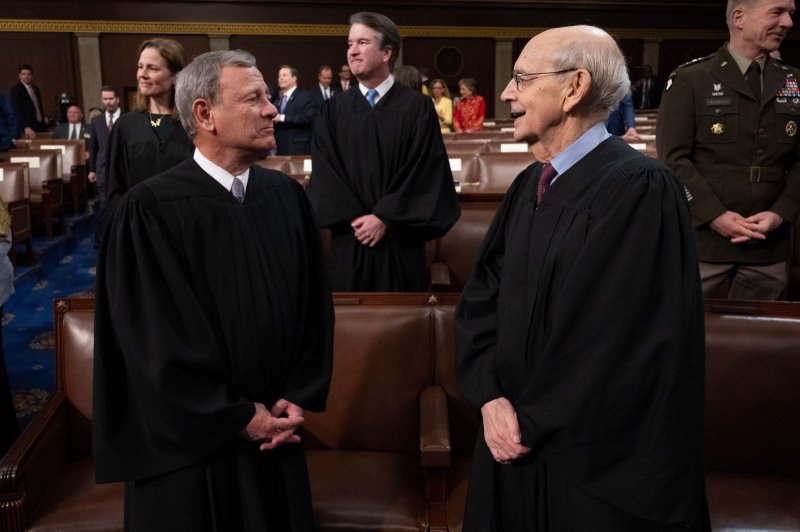Chief Justice of the United States John Roberts speaks with Retiring Supreme Court Associate Justice Stephen Breyer as they attend President Joe Biden's State of the Union address to a Joint Session of Congress in March 2022. File Photo by Saul Loeb/UPI |
License Photo
March 21 (UPI) -- The U.S. Supreme Court on Monday heard arguments about whether lawmakers should be able to help defend the state of North Carolina in a case rooted around a lawsuit over the state's voting rights law.
The case could set future precedent on who can defend a state in federal courts when the state's governor and their administration come from one political party but the other political party controls the state's legislature.
In 2018, the state's Republican-controlled legislature overrode a veto by Gov. Roy Cooper, a Democrat, to pass a law requiring voters to present photo identification when appearing at the polls.
The NAACP filed a lawsuit against the state to prevent the law from being enforced, claiming that it discriminated against minority voters.
Republican lawmakers tried to intervene over claims that Attorney General Josh Stein, a Democrat, has not been effective in defending the state but were denied.
The lawmakers then filed a lawsuit arguing that members of the General Assembly should be allowed to intervene and defend North Carolina from such litigation as the NAACP lawsuit.
David Thompson, who is representing the legislature, said that state law allows lawmakers the authority to defend the laws the body passes and that there is legislative interest in defending the law because the executive branch has to work about its execution, according to the official transcript for the hearing.
Justices Sonia Sotomayor and Elena Kagan questioned Thompson on why the lawmaker's interest in defending the case is necessary as the state's attorney general has said the law is constitutional when defending it.
Kagan also questioned whether letting one or two lawmakers defend the state's interest would then pose a potential situation where all of the state's lawmakers identify themselves as having an interest in defending legislation.
Thompson responded that North Carolina law "quite clearly" designates lawmakers as agents of the state.
"And in your first intervention motion, you said basically we have a separate interest. It's the interest of the legislature. And, you know, that makes a fair amount of sense. It's like, OK, well, that's a different interest," Kagan asked.
"But now you're not saying that. You're claiming the same interest that the Attorney General has under North Carolina law."
Thompson clarified that the legislative body and the executive body have a separate interest in defending the state that "tug at one another."
Justice Amy Coney Barrett interjected and said that she understood that "there's a tug" because the Board of Elections is interested in executing elections and lawmakers are interested in defending the constitutionality of the law.
However, Barrett and Justice Brett Kavanaugh joined Kagan in questioning whether the points Thompson was making would create situations where multiple lawmakers, possibly even with bipartisan interests in a law, would identify themselves as having an interest in defending it.
Thompson replied that "states can create the interest" for other representatives like legislative committee members to be recognized by a court to aid when defending litigation. However, he argued that such questions were not relevant to the particular case before the Supreme Court.
During the hearing, Elisabeth Theodore, who is representing the NAACP, said that "the possibility that different state agents defending state law might have different perspectives and balance state interests differently is a vice, not a virtue of their proposal."
"It requires federal courts to referee instead of just telling the state, look, pick someone to tell us how the state law balance comes out," Theodore said.
However, the justices did seem somewhat hesitant in preventing the North Carolina lawmakers from defending the law.
Chief Justice John Roberts told Theodore that "it does seem a little unfair to me that you want to pick your opponents in court" and that he doesn't see federal courts picking "who is the real representative of a state" when different entities each have a right to intervene under state law.
"If we do ask them to do that, that's putting them in an intensely political position," he said.
Justice Stephen Breyer added that the legislature has "a pretty strong interest" in defending legislation.















